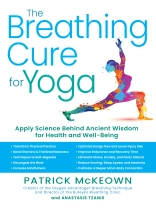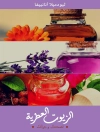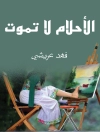READY TO JOIN THE BETTER BREATHING REVOLUTION?
READY TO LEARN FROM INTERNATIONAL BREATHING EXPERT PATRICK Mc KEOWN?
READY TO LEARN FROM LEADING YOGA EDUCATOR ANASTASIS TZANIS?
TAP INTO YOUR FULL YOGA POTENTIAL WITH THE SCIENCE BEHIND ANCIENT WISDOM BY READING THE BREATHING CURE FOR YOGA
With a Foreword by award-winning science journalist James Nestor, New York Times bestselling author of Breath: The New Science of a Lost Art
What if you are only tapping into 75% of the full potential of yoga?
If there was a simple and free way to harness the other 25% and make major improvements in both your asana practice and overall health, would you want to know what it is?
This revolutionary yoga and breathing manual unites modern science, with clinically-proven breathing techniques, and the (mostly) forgotten wisdom of ancient Yogis to enhance your yoga practice. Written by international breath expert Patrick Mc Keown and leading yoga educator Anastasis Tzanis, this is an essential book for every practitioner and instructor.
In THE BREATHING CURE FOR YOGA: APPLY SCIENCE BEHIND ANCIENT WISDOM FOR HEALTH AND WELL-BEING you will learn how to:
- Enhance your physical practice and lower the risk of injury.
- Learn breathing techniques to self-regulate, gain control over your nervous system, and diminish stress, anxiety, and panic attacks.
- Increase mindfulness and cultivate a deeper mind-body connection.
- Learn the connection between physiology and the mind, and how to optimise gas exchange and open the lungs.
- Reduce breathlessness during yoga, and boost stamina, endurance, and recovery time.
- Learn the three pillars of sleep, breath, and the mind, and their interconnection.
- Optimise energy flow and strengthen your connection to self.
- Dramatically reduce snoring, sleep apnea, and insomnia; decongest the nose; and improve menopause symptoms.
- Enhance your overall health and wellbeing.
READY TO JOING THE REVOLUTION NOW?
Get 'Breathing For Yoga’ today, and be among the first to benefit from this revolutionary breathing and yoga manual.
“In your hands is the operating manual for new and old yogis alike. For the past 20 years, Mc Keown has researched why so many of us breathe so poorly and how we can do it better and improve our lives. He’s spent several more years piecing together this carefully constructed compendium of yoga knowledge and distilling it into step-by-step directions, illustrations, scientific context, biomechanics, biochemistry, and more! My advice: Take a seat, shut your mouth, breathe it in.”—James Nestor
Spis treści
TABLE OF CONTENTS to THE BREATHING CURE FOR YOGA: APPLY SCIENCE BEHIND ANCIENT WISDOM FOR HEALTH AND WELL-BEING by Patrick Mc Keown
Foreword
Preface
Introduction
SECTION ONE: THE BREATH IN YOGA AND OXYGEN ADVANTAGE®
Chapter One: The Breath in Yoga and Oxygen Advantage®
Dispelling Common Breath Myths
Our Goal with This Book
Why Breath Training Matters On and Off the Mat
Yoga Origins and Hierarchy
Breath Basics and the Three Dimensions of Breathing
Important: Safety First
Benefits of Yoga and Functional Breathing
Our Recommendation for Navigating This Book
Chapter Two: The Science of Breathing
The Biochemistry of Breathing
The Journey of Oxygen in the Body
Chapter Three: Prānāyāma: Breath Control
Prana and the Eight Limbs of Yoga
What Is Prānāyāma?
What Is Optimal Breathing?
Achieving Steadiness in Breath and Movement
Chapter Four: Applying Oxygen Advantage®
Fundamentals to Yoga
The BOLT Score
Tailoring Your Practice According to the BOLT
Breathing Through the Nose if Your Nose Is Blocked
Oxygen Advantage® Breathing Exercises: The Foundation
Oxygen Advantage® Resources and Support
Chapter Five: Using Simple Breathing Techniques
in Your Asana Practice
SECTION TWO: CREATING A BREATHING PRACTICE
Chapter Six: Hyperventilation, Hypercapnia, and Hypoxia:
What You Need to Know to Create a Breathing Program
The Risks of Overbreathing: Hyperventilation
Breathing Volume: Preventing Hyperventilation During Practice
Resolving Hyperventilation: The Two Pillars of Breath Training
Chapter Seven: Breathing Exercises that Use Deliberate Hyperventilation
What Happens During Deliberate Hyperventilation
Anastasis’ Viewpoint on Voluntary Hyperventilation
Patrick’s Viewpoint on Voluntary Hyperventilation
Our Advice
Chapter Eight: Practical Applications of the Breath
Using the Breath to Prevent Fainting
Using Breath to Moderate Pain
Breath Training to Detoxify the Body
SECTION THREE: THE PHYSICAL STRUCTURES OF BREATHING
Chapter Nine: The Nervous System and Its Interconnection with the Breath
The Autonomic Nervous System
The Influence of the ANS on Cardiovascular and Respiratory Systems
How the Brain Controls the Breath
Chapter Ten: Breathing Biomechanics: A 3D Approach
1. Physical Systems: The Respiratory Tract
2. Physical Systems: The Supportive Muscles
3. Physical Systems: Posture
Structures of Breathing: The Rib Cage
Structures of Breathing: The Diaphragm—The Heart’s Twin Sister
Structures of Breathing: The Abdominals and Pelvic Floor
A Professional Opinion: Dr. Paul Sly on the Pelvic Floor
Chapter Eleven: The Diaphragm
Biochemical Benefits
Biomechanical Benefits
Nervous System
Wider Benefits of Diaphragm Breathing
How to Breathe Diaphragmatically
How to Train Your Diaphragm Through Asanas: Anastasis’ Perspective
Chapter Twelve: The Tongue
The Importance of the Tongue in Posture and Movement
The Tongue, Posture, Tongue-Tie, and Swallowing
The Tongue-Brain Connection
Jihva Bandha—Tongue Lock
How to Clean the Tongue
Paying Attention to Your Tongue
Chapter Thirteen: Breathing to Activate the Core
The Link Between Back Pain and Breathing
The Four Stages of Core Engagement
SECTION FOUR: BREATHING IN A YOGA PRACTICE
Chapter Fourteen: Breathing in Asanas
Breathing and Muscle Oxygenation
Working on Breathing Muscles and Posture for Better Breathing
Five Poses to Release the Diaphragm
Physical Limitations That Affect Breathing in Yoga
Breath-Focused Asana Practices
Chapter Fifteen: Introducing Traditional Breathing Practices—Prānāyāma
Prānāyāma and Kundalini
The Oxygen Advantage® Approach to PrāNāyāma
The Bandhas
Chapter Sixteen: Prānāyāmas to Alter the Length of the Breathing Cycle
1. Kumbhaka (Pausing after Inhaling or Exhaling)
2. Ujjayi Breathing (Throat Constriction)
3. Sama Vritti/Visama Vritti (Equal/Unequal)
4. Anuloma, Viloma, and Pratiloma
5. Kevali (I and II)
6. Bhastrika and Kapalabhati (Voluntary Hyperventilation)
Chapter Seventeen: Prānāyāmas With Specific Outcomes
1. Prānāyāmas That Activate One Side of the Body/Brain
2. Prānāyāmas That Generate Sound Greater Diaphragm Activation
3. Cooling the Body: Sitali and Sitakari
Chapter Eighteen: Comparing Prānāyāma to Oxygen Advantage® Exercises
Prānāyāma and Breathing Exercises in Real Life
SECTION FIVE: HOW THE BREATH AFFECTS DIFFERENT SITUATIONS
Chapter Nineteen: Breathing, the Brain, Identity, and Emotions
The Ego, Yoga, and Breathing
Where Is the Ego? Meditation, the Brain, and the Default Mode Network
Emotions, the Breath, and the Brain
Anastasis on the Breath and Mental State
Breathing in Various Emotional States
Chapter Twenty: Breath Training for Stress, Anxiety, Panic, and Pain
The Science Behind the Breath-Anxiety Connection
Deep, Slow Breathing, Pain Perception, and Mood
Breath Training for Dissolving Stress, Anxiety, and Panic
Chapter Twenty-One: The Nasal Cycle and
Uni-Nostril Breathing
Nasal Breathing and Brain Excitability
The Left/Right Nasal Cycle
Yogic Theory and the Breath
Altering Nasal Dominance
The Autonomic Nervous System and Uni-Nostril Breathing
The Brain and Uni-Nostril Breathing
Scientific Studies and Ancient Yogic Wisdom
Practicing Left Uni-Nostril Breathing
Chapter Twenty-Two: Breathing, Sleep, and Yoga
Poor Sleep and Sleep Disorders
Modern Day Technology and Overstimulated Minds
Chronic Stress and Mental Health Issues
Impact of Poor Sleep
Nasal Breathing
Patrick’s Thoughts on Sleep
Circadian Rhythms
Sleep Hygeine ++
Menopause and Sleep
Yoga and Sleep
Exercises to Improve Sleep
Chapter Twenty-Three: Yoga and the Female Breath
The Menstrual Cycle
Pregnancy
Paced Breathing for Menopause and Hot Flashes
Other Hormonal Considerations that May Affect Breathing
Conclusion
Some Final Words from Patrick
APPENDICES
Appendix One: Yoga and Breathing—A Historical Perspective
on the Synthesis of Oxygen Advantage® and Prānāyāma
Appendix Two: Breathing for Cold Exposure Practice
Oxygen Advantage® Resources and Support
Bonus Interviews with Patrick Mc Keown and Oxygen Advantage Instructors
Acknowledgments
About the Authors
O autorze
JAMES NESTOR (SAN FRANCISCO, CA) is an author and journalist who has written for Outside Magazine, The Atlantic, National Public Radio, The New York Times, Scientific American, Dwell Magazine, The San Francisco Chronicle, and more. Nestor’s book, Breath: The New Science of a Lost Art, was released through Riverhead/Penguin Random House on May 26, 2020. Breath spent 18 weeks of the New York Times bestseller list in the first year of publication and was an instant bestseller in the Wall Street Journal, Los Angeles Times, Sunday London Times, and more. Breath was awarded the Best General Nonfiction Book of 2020 by the American Society of Journalists and Authors and was a Finalist for the Royal Society Science Book of the Year. Breath has sold more than two million copies and has been translated into more than 35 languages. Breath explores how the human species has lost the ability to breathe properly over the past several hundred thousand years and is now suffering from a laundry list of maladies — snoring, sleep apnea, asthma, autoimmune disease — because of it. Nestor travels the world to figure out what went wrong and how to fix it. The answers aren’t found in pulmonology labs, as we might expect, but in the muddy digs of ancient burial sites, secret Soviet facilities, New Jersey choir schools, and the smoggy streets of Sao Paulo. Drawing on thousands of years of medical texts and recent cutting-edge studies in pulmonology, psychology, biochemistry, and human physiology, Breath turns the conventional wisdom of what we thought we knew about our most basic biological function on its head. Nestor’s first narrative nonfiction book, DEEP: Freediving, Renegade Science, and What The Ocean Tells Us about Ourselves (Houghton Mifflin Harcourt) was released in the United States and UK in June 2014. DEEP was a BBC Book of the Week, a Finalist for the PEN American Center Best Sports Book of the Year, an Amazon Best Science Book of 2014, Buzz Feed 19 Best Nonfiction Books of 2014, Art Forum Top 10 Book of 2014, New York Times Book Review Editor’s Choice, Scientific American Recommended Read, and more. The book has been translated into German, Chinese, Italian, Polish, and more; the audiobook, read by Nestor, was released by Audible in June 2016.Nestor also wrote a "little, silly booklet" released in 2009, which he described as "a coffee table thing culled from notes on meditation and other ancient/hippy practices discovered in the crawlspace of my uncle’s retro-mod bachelor pad in the Hollywood Hills. The book combined medical science with humor and illustrations and was given a horrid and misleading title by a dishonest editor, which I soon after—and still—very much regret."Nestor has presented his research at Stanford Medical School, the United Nations, UBS, Global Classroom (World Health Organization+UNICEF), as well as more than 40 radio and television shows, including Fresh Air with Terry Gross, the Joe Rogan Show, Bullet Proof, ABC’s Nightline, CBS Morning News, and dozens of NPR programs.The author lives and works in the San Francisco metro area.Mr James Nestor.com












